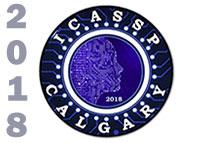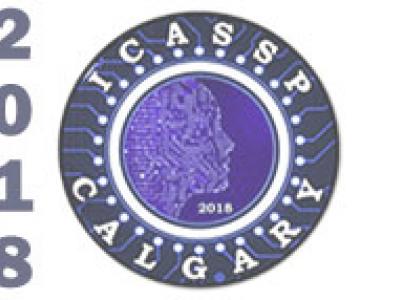
ICASSP is the world’s largest and most comprehensive technical conference focused on signal processing and its applications. The 2019 conference will feature world-class presentations by internationally renowned speakers, cutting-edge session topics and provide a fantastic opportunity to network with like-minded professionals from around the world. Visit website.

- Read more about LEARNING GAUSSIAN GRAPHICAL MODELS USING DISCRIMINATED HUB GRAPHICAL LASSO
- Log in to post comments
We develop a new method called Discriminated Hub Graphical Lasso (DHGL) based on Hub Graphical Lasso (HGL) by providing the prior information of hubs. We apply this new method in two situations: with known hubs and without known hubs. Then we compare DHGL with HGL using several measures of performance. When some hubs are known, we can always estimate the precision matrix better via DHGL than HGL.
- Categories:
 16 Views
16 Views
- Read more about An Investigation of Noise Shaping with Perceptual Weighting for WaveNet-based Speech Generation
- Log in to post comments
We propose a noise shaping method to improve the sound quality of speech signals generated by WaveNet, which is a convolutional neural network (CNN) that predicts a waveform sample sequence as a discrete symbol sequence. Speech signals generated by WaveNet often suffer from noise signals caused by the quantization error generated by representing waveform samples as discrete symbols and the prediction error of the CNN.
ICASSP2018_NS.pdf
- Categories:
 303 Views
303 Views

- Read more about TRANSCRIBING LYRICS FROM COMMERCIAL SONG AUDIO: THE FIRST STEP TOWARDS SINGING CONTENT PROCESSING
- Log in to post comments
Spoken content processing (such as retrieval and browsing) is maturing, but the singing content is still almost completely left out. Songs are human voice carrying plenty of semantic information just as speech, and may be considered as a special type of speech with highly flexible prosody. The various problems in song audio, for example the significantly changing phone duration over highly flexible pitch contours, make the recognition of lyrics from song audio much more difficult. This paper reports an initial attempt towards this goal.
poster_v4.pdf
- Categories:
 12 Views
12 Views
- Read more about LEARNING-BASED COMPLEXITY REDUCTION AND SCALING FOR HEVC ENCODERS
- Log in to post comments
- Categories:
 9 Views
9 Views
- Read more about QUERY-BY-EXAMPLE SPOKEN TERM DETECTION USING ATTENTION-BASED MULTI-HOP NETWORKS
- Log in to post comments
- Categories:
 16 Views
16 Views
- Read more about Feature LMS Algorithms
- Log in to post comments
In recent years, there is a growing effort in the learning algorithms area to propose new strategies to detect and exploit sparsity in the model parameters. In many situations, the sparsity is hidden in the relations among these coefficients so that some suitable tools are required to reveal the potential sparsity. This work proposes a set of LMS-type algorithms, collectively called Feature LMS (F-LMS) algorithms, setting forth a hidden feature of the unknown parameters, which ultimately would improve convergence speed and steady-state mean-squared error.
- Categories:
 23 Views
23 Views
- Read more about A Low Power Hardware Implementation of Multi-Object DPM Detector for Autonomous Driving
- Log in to post comments
Object detection is a fundamental process in traffic management systems and self-driving cars. Deformable part model (DPM) is a popular and competitive detector for its high precision. This paper presents a programmable, low power hardware implementation of DPM based object detection for real-time applications.
- Categories:
 24 Views
24 Views
- Read more about Optimal Spectrum Estimation and System Trade-Off in Long-Distance Frequency-Modulated Continuous-Wave LIDAR
- Log in to post comments
Frequency-modulated continuous-wave (FMCW) LIDAR is a promising technology for next-generation integrated 3D imaging systems. However, it has been considered difficult to apply FMCW LIDAR for long-distance (>100m) targets, such as those in automotive and airborne applications. Maintaining coherence between the reflected beam from the target and locally forwarded beam becomes a significant challenge for tunable laser design.
- Categories:
 71 Views
71 Views